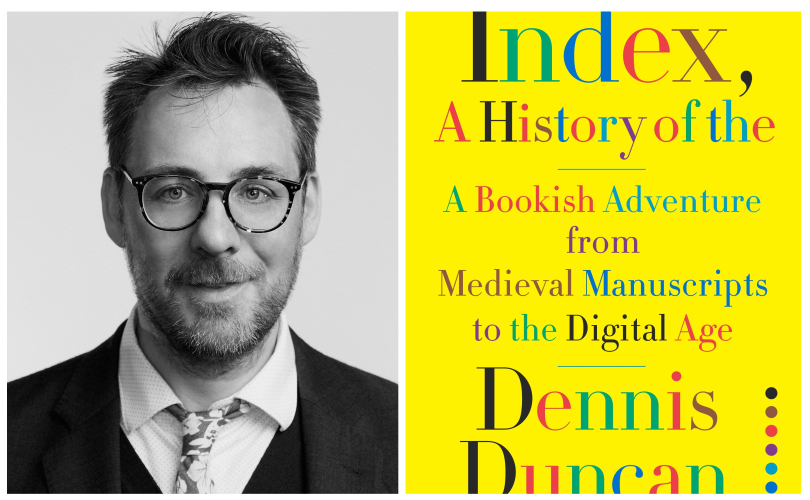
It takes a certain sort of person to write a history of the Index and Dennis Duncan is the right kind of guy to write it: he’s smart and snarky! The subtitle to Index, A History of is A Bookish Adventure from Medieval Manuscripts to the Digital Age. Duncan takes the reader on a chronological adventure from the early times of scrolls to today’s ebooks.
Along the way Duncan shares plenty of juicy facts. Did you know the first English work printed on a printing press was William Caxton’s Recuyell of the Historyes of Troye in 1473. Did you know that William F. Buckley sent Norman Mailer a complimentary copy of his The Unmaking of a Mayor and in the Index next to Mailer’s name, Buckley wrote “Hi!” knowing Mailer would check his name first. Snarky, indeed!
Along with the history of the development of the Index, Duncan spices things up with references to how authors used the Index in various works. Vladimir Nabokov played plenty of Index games in his Pale Fire. Duncan shows where the Index is a key factor in “A Scandal in Bohemia” where Irene Adler outwits Sherlock Holmes.
Duncan deals with contemporary indexing by quoting Google engineer Matt Cutts who explains that “The first thing to understand is that when you do a Google search, you aren’t actually searching the web. You’re searching Google’s index of the web” (p. 1-2).
There was an old saying in Graduate School that if you could master the use of the Index, you would have access to all knowledge. That not far from true. Index, The History of is a great book filled with knowledge and fun! GRADE: A
Table of Contents:
Introduction 1
1 Point of Order On Alphabetical Arrangement 19
2 The Births of the Index Preaching and Teaching 49
3 Where Would We Be Without It? The Miracle of the Page Number 85
4 The Map or the Territory The Index on Trial 113
5 ‘Let No Damned Tory Index My History!’ Sparring in the Back Pages 136
6 Indexing Fictions Naming was Always a Difficult Art 171
7 ‘A Key to All Knowledge’ The Universal Index 203
8 Ludmilla and Lotaria The Book Index in the Age of Search 230
Coda: Archives of Reading 261
Notes 273
List of Figures 299
Acknowledgements 303
Appendix: A Computer-generated Index 307
Index 313
I have a friend this would be perfect for.
Patti, I loved INDEX. I’ve had decades of experience working with indexes.
Sounds like fun. Bill Crider would have loved this,
Jeff, I had the same thought while reading INDEX: Bill Crider would have loved it!
For a moment I was stunned …
George writing about the Index?
Here in Europe this means or meant the Index of forbidden books by the catholic church. It’s almost a pity that it was abolished 60 years ago or so. As teenagers my friends and I would look there for interesting books like Lady Chatterley. Though most books on the Index would be philosophical or science which the church didn’t like.
https://en.wikipedia.org/wiki/List_of_authors_and_works_on_the_Index_Librorum_Prohibitorum
Wolf, this INDEX is a lot more fun than reading a list of banned books. The Church added Machiavelli’s THE PRINCE to their Index…a sign they didn’t understand the book.
Btw in German the plural form of index is “indizes” – important in mathmatics.
One of my favorite writers, Barbara Pym, supported herself indexing scholarly journals for many years—sadly, her wonderful books didn’t sell enough to support her. Several of her heroines also do indexing work. In the days before computers, I imagine it was rather tedious work and required great attention to detail.
Deb, I’m reviewing a Barbara Pym novel this weekend! No indexing in this one, but I have several Barbara Pym novels on my shelf that I hope to read and review this Summer. I did some indexing in my courses in Library Science. Now, there’s software that takes a lot of the tediousness out of indexing.
I agree. I’ve done indexing in the past too and yes, it was tedious in the pre-computer days. Bill Deeck did the Index for my fanzine (The Poisoned Pen) as well as others, and I know there was a tremendous amount of time and effort involved. I’m one of those people who loves to look through an index and feel that something important is missing if a non fiction book doesn’t have one.
Now Barbara Pym is an author I’ve always meant to read but never have. Any suggestions on where to start, Deb?
Jeff—I would recommend EXCELLENT WOMEN as possibly her most representative book. But I think all of her books are very good.
Deb, if people don’t believe in synchronicity then here’s a perfect example: the Barbara Pym book I’m reviewing on Saturday is EXCELLENT WOMEN! Hope you like the review.